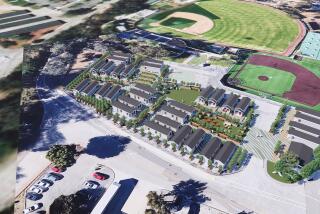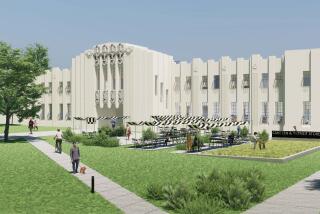Speaker’s Plan Adds Veterans Home to His District
SACRAMENTO — SACRAMENTO -- Assembly Speaker Herb Wesson is quietly shepherding a bill to scale down two voter-endorsed veterans homes in Southern California in order to construct a “primo” residence in West Los Angeles.
Wesson’s 500-bed proposal, planned for a site near the U.S. Veterans Affairs Medical Center and the UCLA Medical School, is the latest entry in the Legislature’s long-running pork-barrel battle to serve the state’s expanding population of aging and ailing veterans.
“This could be the biggest thing to happen in the veterans community in I don’t know how long,” Wesson said last week, adding that it would include a critically needed specialized care unit for veterans suffering from Alzheimer’s disease.
But what he calls the “primo of primo veterans facilities” in West L.A. is causing political problems for some of his fellow Democrats and drawing criticism from some Republicans.
And lawmakers from both parties express concern that Wesson’s first major initiative as speaker would put a coveted project in his own Culver City-based district at the expense of their own pet veterans projects.
“Why is Los Angeles put ahead in this bill?” Democratic Assemblywoman Sarah Reyes of Fresno demanded at a hearing on the measure (AB 2559) last week. She and other San Joaquin Valley legislators have long lobbied for a vets’ home in their region.
“We don’t want to get left in the dust again,” said another San Joaquin Valley Democrat, Assemblyman Dennis Cardoza of Merced.
California voters overwhelmingly approved a $50-million bond issue in 2000 to finance veterans homes in Lancaster and the Ventura County community of Saticoy. It also included $24 million for construction of other vets’ homes in the future. In addition, the federal Department of Veterans Affairs pays 65% of the cost of building and rehabilitating state-run veterans homes. State officials expect to receive as much as $55 million next year from the U.S. government.
It is uncertain now how much each of the homes at Lancaster, Saticoy and West L.A. would cost. The bond issue authorized $26 million for two 400-bed facilities at Lancaster and Saticoy and remodeling of the 114-year-old state home at Yountville, originally built to shelter Civil War and Spanish American War vets.
Under the Wesson bill, beds at both Lancaster and Saticoy would be reduced to about 100 each, but the West L.A. facility would get 500. The project has not been fully scrutinized by the Legislature, including the budget committees.
In advance of legislative action, the Davis administration quietly sought federal approval of the West L.A. project as a mere “change in scope” in plans for the Lancaster home. It was rejected this month by the U.S. Department of Veterans Affairs on grounds that the change was “so different” that the L.A. home would require an entirely new application of its own.
A high-level advisory committee strongly recommended the West L.A. facility to Davis last year, noting that about 30% of the state’s veterans live in Los Angeles and Orange counties and that some will soon need residential and medical facilities close by.
Wesson said these vets would receive medical care from UCLA physicians, whom he called “the best docs in the world.” The residents also could play golf on a nine-hole course, watch UCLA baseball games at an adjacent ball field, worship at three on-campus churches and have access to a public bus system.
But Wesson’s plan raised the suspicions of Sen. William “Pete” Knight (R-Palmdale), a retired Air Force pilot who overcame eight years of political and bureaucratic setbacks before getting a vets’ home approved for Lancaster.
At a hearing of the Senate Veterans Affairs Committee last week, Knight said he feared the Lancaster home would fall victim to a power grab.
Sen. Joe Dunn (D-Santa Ana) said he shared Knight’s fears and deplored what he saw as “gamesmanship” surrounding the Wesson bill.
The committee approved a companion bill (SB 1234) by Sen. Maurice Johannessen (R-Redding) that would commit the state to financing one veterans home at Redding and another at Fresno with lease-revenue bonds at some time in the future. This bill is aimed at placating lawmakers such as Reyes and Cardoza and creating a hometown legacy for the retiring Johannessen.
The committee also approved a separate bill (SB 1773) by Sen. Wes Chesbro (D-Arcata) that would earmark $15 million for completion of the remodeling of the Yountville home.
Currently, there are three state-operated veterans homes in California: at Yountville, Barstow and Chula Vista. Two expandable facilities have been approved for Lancaster and Saticoy, while the West L.A. project would become the sixth. The Fresno and Redding homes would become the seventh and eighth.
More to Read
Get the L.A. Times Politics newsletter
Deeply reported insights into legislation, politics and policy from Sacramento, Washington and beyond. In your inbox three times per week.
You may occasionally receive promotional content from the Los Angeles Times.










